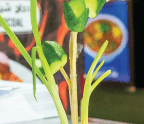When Nick didn’t arrive at the café on time, I was relieved. I thought he’d gotten cold feet. The waitress came to take my plate. “Was there something wrong with it?” she asked, smiling. I assured her the problem was me. Then my phone dinged. “I’m in the waiting room,” read Nick’s text. When I replied, he apologized elaborately; he’d forgotten where we’d said we’d meet. “It’s fine,” I wrote, “I’m leaving now.” “Stay there,” he commanded. “Two minutes.”
When he arrived, the first thing I noticed was his hair. No more floppy, boyish bangs, just a film of dark fuzz. He was tall and tan, sunken-cheeked, with dark-rimmed glasses. If anything, a shaved head made him handsomer. A day earlier, he’d turned thirty-four. I remembered turning thirty-four. It was fun. I’d felt sexy and young back then, like I had another year or so before I disintegrated into liquid garbage. Now I was thirty-six. I wondered how Nick felt. He was certainly sexy. I’d seen people hit on him in the street. They hit on him in the meat department and at the DMV. He also had a youthful lifestyle: he lived with four other guys in a converted Bushwick loft that until recently had been infested with bedbugs. But maybe the haircut was a sign he was growing up.
I’d had to teach late the previous night and hadn’t been able to take him out for his birthday. While I waited for the waitress to run my card, I handed Nick a gift, a New York Review of Books T-shirt. He loved the NYRB. He stared at me, a tragic expression on his face. Without removing the shirt from its plastic sleeve, he told me it was too big. As we left, the host wished us a good day.
Nick unlocked his bike and chaperoned it down the street. It was early September and hot. He hunched forward, grimacing. I asked if he was okay. “Not really,” he said, gritting his teeth. When I asked what was wrong, he said he’d herniated a disc while changing a bike tire.
“That’s awful,” I said, skeptically. “You went to the doctor?”
“No,” he said. “But from the description online, I’m pretty sure. I’m having shooting pains.”
We passed through the metal detector, and Nick took a seat in the lobby. It was grim and sparsely populated. Old women with little kids, a few men. Nick took out his laptop and nodded sadly. He wasn’t allowed to go where I was going.
After being led to a different part of the lobby, I signed some paperwork, waited to hear my name called, and took the elevator up alone. Upstairs, the waiting room was nearly full. There were no old women, no kids. All the men wore blue or green scrubs. Everyone looked anxious and exhausted, like this was a predawn airport terminal. The light was luridly bright, the floor grubby blue linoleum. On the walls were two pastel watercolors of trees. A sign on the far door said NO CHANGING.
No one made eye contact. One woman cried loudly, holding a tissue. Some held teal cotton gowns. Another looked six or seven months pregnant, and I wondered why she was there. Maybe this was where she got prenatal care. Maybe her life was in danger.
All the seats faced a large-screen TV: Octavius and Seth were remodeling, contemplating adoption. The volume was so high that it was hard to hear the clinicians. “Shanka?” said an old Russian nurse with hair like an apricot cloud. “Shanka?” she called three more times, before breaching protocol and adding a last name. A tall Black woman near me stood. “Shaniqua,” she corrected. I was indignant on her behalf. But I also felt sympathy for the nurse, whom people must never be very glad to see. She seemed unfazed. “Shaniqua,” she said. “Come with me.”
The air-conditioning was strong, it raised the hair on my arms. I texted Nick that it would be a long wait, he shouldn’t stay. But he insisted.
It had been three months since we met. On our first date, he was wearing the same Jacob’s Pillow shirt he’d had on in the photo our mutual friend had sent me when he’d set us up. It


